South Sudan speaker of parliament says NGOs bill one of his achievements
June 21, 2016 (JUBA) – Manasseh Magok Rundial, speaker of the national legislative assembly of South Sudan, has hailed the enactment of restrictive non-governmental organizations bill as one of his achievements as head of the parliament.

“I don’t know the views of others but in my view, particularly on the NGO Act 2016, I consider it one of the best laws the parliament has ever made since independence and is one of the reasons I will leave the position of the speaker happy,” Rundial claimed.
The acts, he said, established the legal framework and regulatory body that has the mandate to implement the activities of nonprofit-making organisations operating in the country, including those engaged in civil society activities.
The enactment of the two separate acts came after President Salva Kiir declined to sign the NGO Bill, 2015, which combined the RRC Act with NGO Act. He recommended separation of NGO Act from RRC Act.
Observations of the president at the time and the final drafts of the laws were not made public before adoption. The two acts are now presumed to have started being operational, though the RRC issued a Notice on 10 May, 2016, stating that there would be a “delay” in implementing the NGO Act, due to “technical reasons.
While the RRC is officially not operational due to the technical reasons stated by the notice, the NGO act is presumed to be active, sparking concerns from non-governmental organizations required by the new law to register with the commission or else risk being denied their existence and operation.
Speaking in an exclusive interview on Thursday, Rundial said he would leave the top parliamentary assignment as a happy man because he managed to guide the house to produce one of the best laws which takes into consideration the interest of the country and its people.
He explained that the not-for-profit organizations have a culture of soliciting funds from donor communities under the guise of helping the under-privileged and come to saturate local job market by employing their own at the expense of local workers.
He said the NGO Act empowered South Sudanese citizens to get majority employment in the organizations that go out to donor communities to solicit funds in the name of the people of South Sudan.
“These NGOs are given funds by the donors to come and help the people of South Sudan and complement the work of the government. This means that the majority of the workers they are employing should come from South Sudan because these funds were solicited to help the people of South Sudan,” he added.
“But this is not what is happening, even though the solicit money in our names of our people. We have noticed that majority of the people who are well paid even after doing the same work with national staff colleagues are international staff members. We said no as parliament. Under international labour law, people doing the same work with the same qualifications and skills should be rewarded equally. The differences should be in allowances but the reality of the situation today in South Sudan is the opposite. This was why the parliament felt it was the right time to correct this by producing a legal framework and regulatory body,” Rundial further explained.
The tough talk from the head of the national parliament, which is due for dissolution in order to be reconstituted in accordance with the terms of the peace agreement, followed new administrative directives and guidelines issued this week requiring NGOS to register with the commission in fulfilment of the legislation.
The legislation requires that foreign nationals intending to work in the country should be evaluated for competence by a relevant authority before being officially hired by the recruiting international organizations operating in the country.
Many South Sudanese have also been arguing over the past years that international organizations dealing in different sectors, including health, agriculture and humanitarian activities bring under-qualified staff from outside the country and pay those more after assigning them as supervisors over otherwise better-qualified South Sudanese nationals.
In health sector, for instance, some of the foreign medical practitioners allegedly work in diagnosing ailments, prescribing treatment and in some cases performing surgical procedures, without obtaining a work permit because international organizations employing them consider the requirement for fresh assessment as unnecessary.
(ST)
